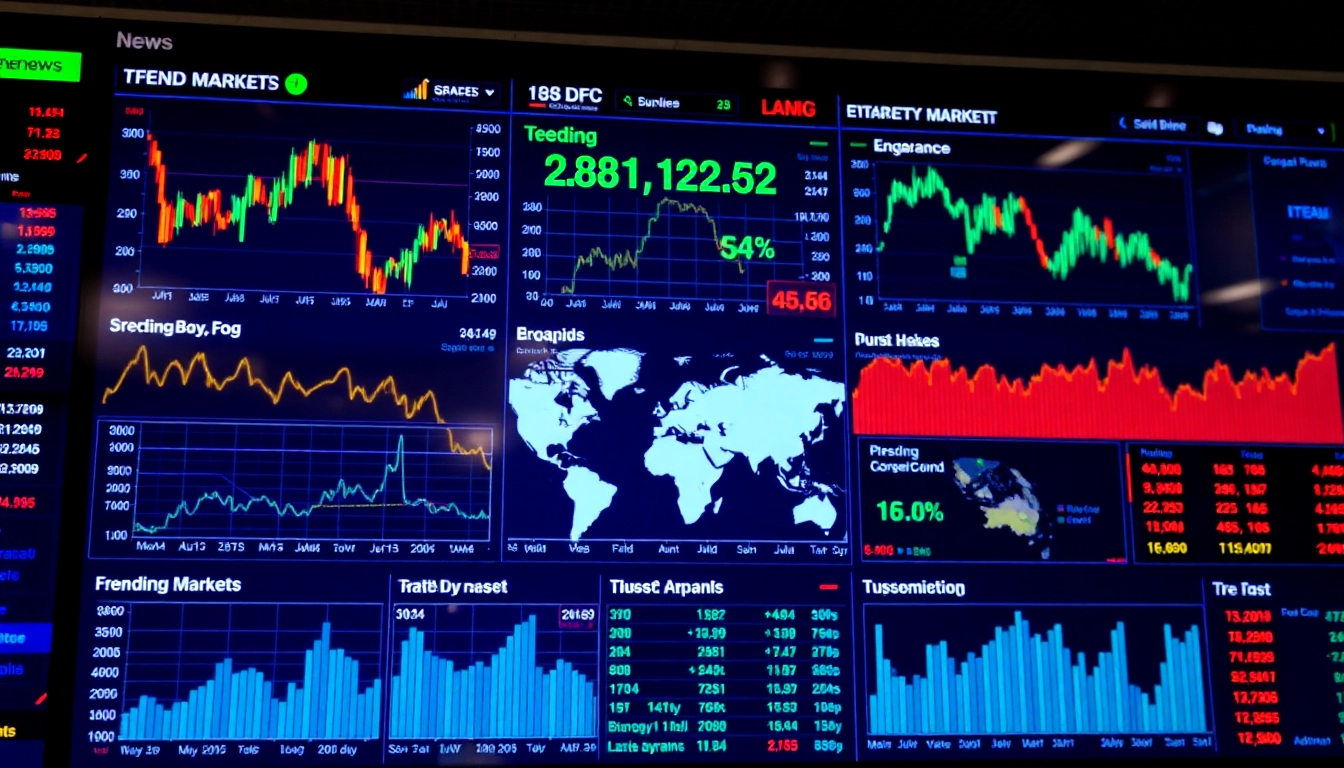The global financial landscape is experiencing a period of notable volatility and transformation, with several key indicators influencing investor sentiment and market strategies. Central to this dynamic environment is the realm of Real Estate Investment News, which remains a vital component for investors seeking to navigate fluctuating markets. From the latest movements in stock markets and gold prices to geopolitical developments and technological innovations, understanding the current state of real estate investment requires a comprehensive analysis of diverse economic influences and market trends.
Understanding the Current State of Real Estate Investment News
Global economic influences on real estate markets
The trajectory of real estate markets is heavily impacted by broader economic factors such as interest rates, inflation, currency fluctuations, and geopolitical stability. Recent news highlights a cautious optimism in global equities, amidst mixed data from regions like Europe, Asia, and North America. For instance, European shares closed marginally higher, supported by defense sector gains, while the US dollar experienced a slight decline based on labor data indicating potential shifts in monetary policy. Such movements directly influence property valuations, financing conditions, and investor appetite in various markets. International economic events, including U.S. rate cut hopes and China’s weak industrial data, further complicate the outlook, making it crucial for investors to monitor macroeconomic indicators continuously.
Recent shifts in property valuation and demand
Property valuations are witnessing fluctuating demand patterns, driven by changes in interest rates and investor risk appetite. The recent surge in gold prices to record levels ($3,501.59 an ounce) signals investor safety-seeking behavior amidst market uncertainty. Conversely, some sectors like commercial real estate are experiencing rising interest, riding on the path of economic recovery, while others face pressures from regulatory changes and environmental concerns. In addition, emerging markets and sectors, such as logistics and data centers, are gaining traction due to technological shifts and changing consumer behaviors. Investors who align their strategies with these shifts, leveraging real-time news and data, can better time their entry and exit points, optimizing returns.
The impact of financial news on investor sentiment
Financial news exerts a profound influence on investor psychology and decision-making. Headlines about market volatility, regulatory crackdowns, or geopolitical tensions can trigger sudden sell-offs or bullish rallies. For example, news of the UK government extending a deadline on crowdfunding platforms or a U.S. Fed rate cut hopes can swiftly impact property investment sentiment, prompting reconsideration of risk exposures. Moreover, developments such as Meta exploring partnerships to enhance apps exemplify how technological advances and institutional moves shape market perceptions. Staying informed through reliable sources allows investors to anticipate market reactions and adjust their portfolios proactively, emphasizing the importance of integrated news analysis in real estate investment strategies.
Key Trends Shaping Real Estate Investment News
Rising interest in commercial properties amid economic recovery
The resurgence of interest in commercial real estate, particularly logistics and industrial properties, reflects broader economic recovery efforts. As global supply chains reconfigure post-pandemic, logistics hubs and warehousing spaces are in high demand, supported by e-commerce growth. For instance, increased investment flows into these sectors have driven up valuations, making them attractive for institutional investors. Additionally, urban regeneration projects and government incentives further bolster this trend, indicating a shift towards more resilient, income-generating assets in commercial real estate portfolios.
The role of governmental policies in market dynamics
Government policies and regulatory frameworks significantly influence real estate investment landscapes. Recent actions include the Bank of England warning Facebook (Meta) about strict conditions surrounding the UK release of Libra, signaling regulatory scrutiny in digital currencies and fintech that affect related property sectors. In other regions, policies promoting green building standards or offering tax incentives for sustainable developments are reshaping market dynamics. Accurate interpretation of these policies—and their implementation—enables investors to identify emerging opportunities and mitigate risks associated with legal and regulatory shifts.
Technological innovations transforming property investment strategies
Advancements in technology, especially AI and data analytics, are revolutionizing property investment. Meta’s integration of external AI models into internal tools exemplifies how data-driven decision-making enhances market insights. Similarly, the rise of digital platforms like Robinhood and Coinbase is changing how investors access and trade assets, including real estate tokenization and fractional ownership. These innovations facilitate transparency, liquidity, and diversification, empowering investors to develop more precise strategies based on real-time market data and predictive analytics.
Strategies for Staying Ahead in Real Estate Investment News
Analyzing market data and financial indicators
Successful investors rely on a disciplined approach to analyzing market data such as interest rate trends, inflation figures, and currency movements. For example, the recent drop in oil prices—yet with a weekly gain—indicates potential macroeconomic shifts that influence property demand, especially in resource-dependent regions. Key indicators like the 200-week trendline for cryptocurrencies provide insights into market momentum and potential turning points. Regularly evaluating these metrics helps investors anticipate market cycles and adjust their portfolios accordingly.
Utilizing digital tools for market insights and forecasting
Integrating digital tools—such as AI-driven analytics platforms, economic sentiment analysis, and real-time news feeds—can significantly enhance forecasting accuracy. Platforms that aggregate global news, financial data, and sentiment analysis enable investors to identify emerging trends swiftly. For instance, tracking movements in NFT market caps or iron ore futures can signal sector-specific opportunities or risks, informing timely entry or exit decisions in real estate sectors impacted by commodities and technological trends.
Building diversified portfolios based on current news trends
Diversification remains a core principle in reducing risk amid volatile markets. With global equities experiencing dips, gold reaching new records, and digital assets like Bitcoin maintaining complexity, investors are advised to allocate across asset classes, including residential, commercial, and alternative real estate sectors. Developing a diversified portfolio aligned with current news—such as infrastructure investment prospects or technological innovations—can buffer against sector-specific downturns and harness emerging growth opportunities.
Risks and Challenges Highlighted in Real Estate Investment News
Market volatility and potential downturn signals
Rapid fluctuations in global markets, as seen in the drop of global equities and the slowdown of Ether rally, pose significant risks. Heightened geopolitical tensions, regulatory crackdowns, and macroeconomic shocks (e.g., Trump-Fed feud influencing currency and rate expectations) can trigger sudden downturns. Investors must vigilantly monitor these signs, employing risk mitigation strategies like stop-loss orders, hedging, and dynamic asset allocation.
Regulatory and legal considerations for investors
Regulatory environments are evolving rapidly, with notable examples such as the European Commission’s scrutiny of cryptocurrencies and the UK’s strict conditions for crypto app launches. Legal considerations surrounding property rights, taxation, and foreign investment restrictions also demand careful compliance and due diligence. Staying informed about legal developments and engaging with legal advisors can prevent costly missteps and ensure adherence to changing standards.
Environmental and sustainability concerns affecting valuations
Increasing emphasis on sustainability is impacting valuation cycles, with environmentally friendly developments commanding higher premiums and non-compliant assets facing devaluation. Investors should focus on green certification standards, climate adaptation measures, and environmental risk assessments when appraising opportunities, integrating ESG factors into their strategic decision-making process.
Future Outlook and Opportunities in Real Estate Investment News
Emerging regions and sectors to watch
Emerging markets in Africa, Southeast Asia, and parts of Eastern Europe present new growth opportunities driven by urbanization and technological adoption. Sectors such as data centers, logistics hubs, and renewable energy infrastructure are poised for expansion, supported by government incentives and global supply chain shifts. Investors who identify early-stage opportunities in these regions can capitalize on high-growth potential.
Forecasts on market growth and stability
While uncertainties persist, projections indicate moderate to strong growth in specific sectors, particularly those aligned with sustainability and technological innovation. Market stability will depend on geopolitical stability, fiscal policies, and technological disruption pace. Continuous monitoring and flexible investment strategies will be essential to adapt to evolving market conditions.
Innovative investment models and partnership opportunities
New models such as Real Estate Tokenization, crowdfunding, and Public-Private Partnerships (PPPs) are redefining investment access and risk-sharing. Collaborations between tech firms like Meta and traditional real estate developers can lead to novel offerings, such as digital ownership platforms or augmented property experiences. Embracing these models allows investors to diversify risk, increase liquidity, and tap into untapped markets.



